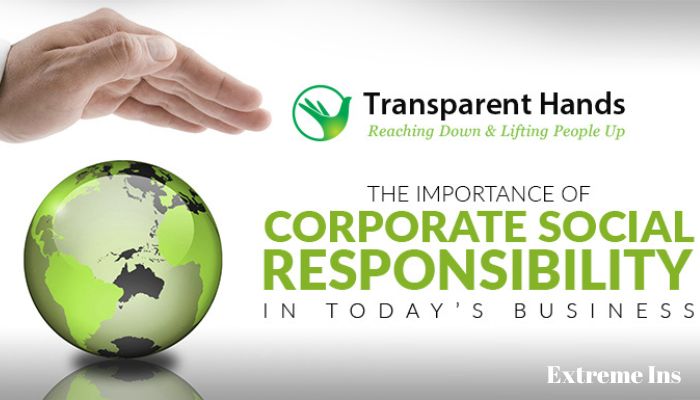Creating a Better World: The Power of Corporate Social Responsibility
In an era where businesses play a significant role in shaping the global landscape, the concept of Corporate Social Responsibility (CSR) has gained prominence as a powerful tool for creating a better world. Beyond traditional profit motives, companies are increasingly recognizing the importance of contributing positively to society and the environment. This paradigm shift towards a more sustainable and socially conscious business model is not only ethical but also makes good business sense. In this article, we will explore the various facets of CSR, its impact on businesses and society, and how organizations can leverage this powerful tool to drive positive change.
Understanding Corporate Social Responsibility
Corporate Social Responsibility, often referred to as CSR, is a business approach that goes beyond financial goals and profit maximization. It encompasses a company’s commitment to operate ethically, contribute to economic development, and improve the quality of life for its employees and society at large. CSR involves a broad spectrum of activities, including environmental sustainability, social justice, community development, and ethical business practices.

The roots of CSR can be traced back to the early 20th century when some visionary entrepreneurs started recognizing the social and environmental consequences of industrialization. However, it wasn’t until the latter half of the century that CSR gained widespread attention. In recent decades, the growing awareness of environmental issues, social inequalities, and ethical concerns has propelled CSR to the forefront of corporate agendas.
The Pillars of Corporate Social Responsibility
CSR is often categorized into four main pillars, commonly referred to as the “quadruple bottom line” or the “four Ps”:
Profit: This is the traditional bottom line that focuses on financial performance and profit generation. While profit is crucial for business sustainability, it is no longer the sole metric for success in the context of CSR.
People: The social aspect of CSR centers on how a company impacts its employees, customers, and the broader community. This includes fair labor practices, employee well-being, diversity and inclusion, and community engagement.
Planet: The environmental pillar of CSR is concerned with a company’s impact on the environment. This involves sustainable practices, resource conservation, waste reduction, and efforts to mitigate climate change.
Purpose: Purpose-driven CSR emphasizes the importance of aligning a company’s activities with a broader societal purpose. This involves ethical business practices, transparent communication, and a commitment to social and environmental causes.
By integrating these four pillars into their business strategies, organizations can create a more holistic and sustainable approach to corporate management.
The Impact of CSR on Businesses

1. Enhanced Reputation and Brand Image:
Embracing CSR can significantly enhance a company’s reputation and brand image. Consumers today are more socially conscious and are inclined to support businesses that demonstrate a commitment to social and environmental responsibility. Positive brand perception not only attracts customers but also fosters loyalty and trust.
2. Attracting and Retaining Talent:
In a competitive job market, attracting and retaining top talent is a priority for businesses. Millennials and Generation Z, in particular, are known for prioritizing companies with a strong sense of purpose and values. Adopting CSR initiatives can be a powerful tool for recruitment and employee retention, contributing to a positive corporate culture.
3. Risk Mitigation:
Businesses face various risks, including legal, reputational, and operational risks. Engaging in socially responsible practices helps mitigate these risks by demonstrating a commitment to ethical conduct and compliance with regulations. This, in turn, reduces the likelihood of legal issues and reputational damage.
4. Cost Savings Through Sustainability:
Sustainable practices not only benefit the environment but can also lead to cost savings for businesses. Energy efficiency, waste reduction, and responsible sourcing contribute to operational efficiency and resource conservation, ultimately positively impacting the bottom line.
5. Access to Capital:
When making investment decisions, investors are increasingly taking environmental, social, and governance (ESG) factors into account.Companies with strong CSR initiatives may find it easier to attract capital and investments from socially responsible investors who prioritize sustainability and ethical business practices.
6. Market Differentiation:
CSR can be a crucial differentiator in a crowded market. Companies that actively engage in social and environmental initiatives stand out from their competitors, attracting a consumer base that values conscious consumption.
CSR in Action: Notable Examples

Several companies have successfully integrated CSR into their business models, setting examples for the industry. Here are a few notable examples:
1. Patagonia:
Patagonia, a renowned outdoor clothing company, is a trailblazer in sustainability. The company has a commitment to environmental causes and is known for initiatives like the “1% for the Planet” program, where it donates 1% of its sales to environmental organizations. Patagonia’s transparent approach to CSR has strengthened its brand and resonated with environmentally conscious consumers.
2. Microsoft:
Microsoft has taken a comprehensive approach to CSR, focusing on environmental sustainability, accessibility, and community engagement. The company has committed to becoming carbon-negative by 2030 and has invested in programs to bridge the digital divide, providing technology access to underserved communities.
3. Unilever:
Unilever, a global consumer goods company, has embedded sustainability into its business strategy through its Sustainable Living Plan. The plan outlines ambitious goals, including halving the environmental footprint of its products and improving the livelihoods of millions of people in its supply chain. Unilever’s commitment to sustainability has not only positively impacted its reputation but has also driven innovation in product development.
4. TOMS:
TOMS, a footwear and eyewear company, has pioneered the “One for One” business model. TOMS donates a pair of shoes to a child in need for each pair that is sold. This simple yet impactful approach has resonated with consumers, and TOMS has become synonymous with socially responsible consumerism.
Overcoming Challenges in Implementing CSR

While the benefits of CSR are evident, implementing effective CSR initiatives comes with its challenges. TOMS donates a pair of shoes to a child in need for each pair that is sold:
1. Resource Allocation:
One of the primary challenges is allocating resources for CSR initiatives. Businesses often face budget constraints and must balance their commitment to social responsibility with financial viability. However, the long-term benefits, including enhanced reputation and customer loyalty, often outweigh the initial costs.
2. Measuring Impact:
Measuring the impact of CSR initiatives can be challenging, as it involves both qualitative and quantitative assessments. Companies need to develop robust metrics and reporting mechanisms to track and communicate their social and environmental contributions accurately.
3. Integration into Core Business Strategy:
For CSR to be effective, it must be integrated into the core business strategy rather than treated as a standalone initiative. This requires a cultural shift within the organization, with a commitment to ethical business practices and social responsibility at all levels.
4. Balancing Stakeholder Interests:
Companies operate within complex ecosystems with diverse stakeholders, each with different expectations. Balancing the interests of shareholders, employees, customers, and the broader community requires careful consideration and effective communication.
5. Navigating Global Complexity:
Global companies face the challenge of navigating diverse cultural, regulatory, and societal landscapes. CSR initiatives must be adaptable to different contexts while maintaining a consistent commitment to ethical standards.
The Future of Corporate Social Responsibility

As the world continues to face pressing challenges, including climate change, social inequality, and the depletion of natural resources, the role of CSR becomes increasingly crucial. The future of CSR is likely to see the following trends:
1. Technology and Innovation:
Technology will play a pivotal role in driving CSR initiatives. From sustainable supply chain management to leveraging data for social impact, businesses will increasingly use technology and innovation to address global challenges.
2. Stakeholder Engagement:
The focus on stakeholder engagement will continue to grow, with companies actively seeking input from employees, customers, and communities. This collaborative approach ensures that CSR initiatives are aligned with the needs and expectations of all stakeholders.
3. Regulatory Changes:
Governments and regulatory bodies are expected to play a more active role in shaping CSR practices. Companies may face stricter regulations and reporting requirements, pushing them to adopt more comprehensive and transparent CSR strategies.
4. Circular Economy Practices:
The adoption of circular economy practices, where resources are used more efficiently, recycled, and repurposed, will become integral to CSR. Companies will strive to minimize waste and promote sustainable consumption patterns.
5. Focus on Social Justice:
The emphasis on social justice and diversity will continue to be a central theme in CSR. Companies will be expected to address issues of inequality within their organizations and contribute to social justice initiatives on a broader scale.
6. Education and Awareness:
Increasing awareness and education around CSR will empower consumers to make informed choices. As consumers become more discerning, companies will need to transparently communicate their CSR efforts to build trust and loyalty.
Conclusion
In conclusion, Corporate Social Responsibility is a powerful force for creating a better world. As businesses embrace a broader sense of responsibility, they have the potential to drive positive social and environmental change. From enhancing brand reputation to attracting top talent and contributing to sustainable development, the benefits of CSR are manifold. While challenges exist, the long-term rewards make it clear that CSR is not just a trend but a fundamental shift in the way businesses operate.
As we look towards the future, the integration of CSR into core business strategies, technological innovation, and a commitment to social justice will be essential. Companies that prioritize CSR are not only contributing to the well-being of society and the planet but are also positioning themselves for long-term success in an increasingly conscious and interconnected world. By harnessing the power of Corporate Social Responsibility, businesses can be catalysts for positive change, creating a legacy that goes beyond financial success to leave a lasting impact on the world.


